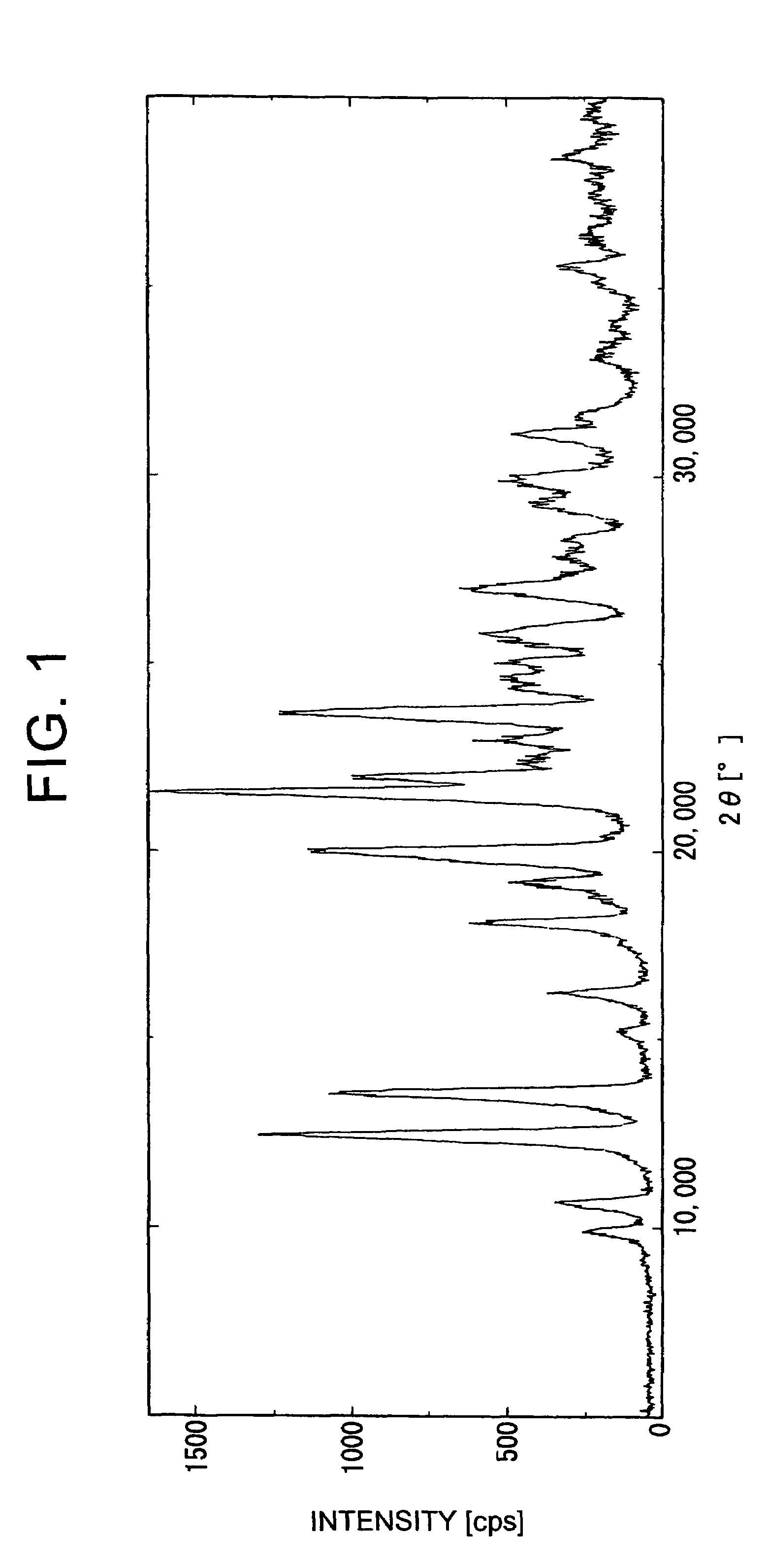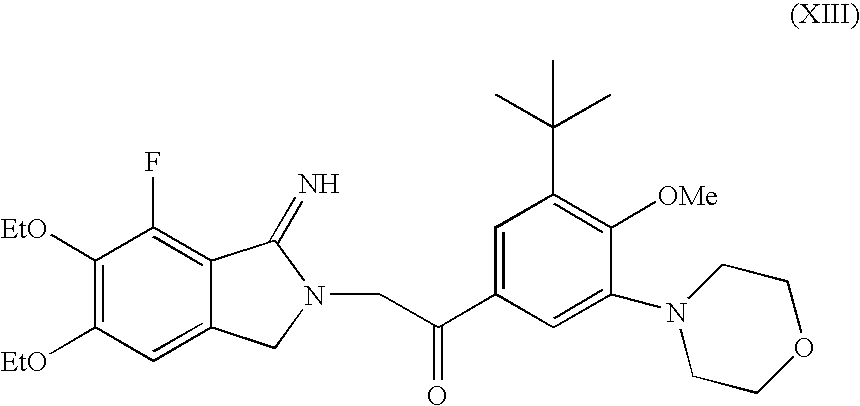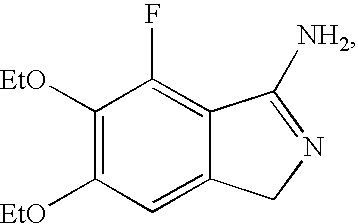Methods for producing cyclic benzamidine derivatives
a technology of cyclic benzamidine and derivatives, which is applied in the preparation of sulfonic acid esters, animal repellents, biocides, etc., can solve the problems of low overall yield, complex purification, and low yield of desired compounds
- Summary
- Abstract
- Description
- Claims
- Application Information
AI Technical Summary
Benefits of technology
Problems solved by technology
Method used
Image
Examples
preparation example 1
1-Bromo-3,4-diethoxy-2-fluorobenzene
[0377]
[0378]A solution of N-bromosuccinimide (NBS) (153.72 g, 864 mmol) in acetonitrile (1.5 L) was added dropwise to a solution of 1,2-diethoxy-3-fluorobenzene (150.00 g, 814 mmol) in acetonitrile (900 mL) on ice, and this was stirred at room temperature overnight. After the solvent was distilled off, ethyl acetate was added to the residue and washed with water. The obtained aqueous layer was extracted again with ethyl acetate, and the extract was combined with the aforementioned organic layer. The organic layer was washed sequentially with water, saturated brine, and water again, and was dried over anhydrous magnesium sulfate. The solution was concentrated and an oily substance was obtained. Following hexane addition to the oily substance, crystals that have precipitated were removed by filtration. The remaining solution was concentrated to yield an oily substance, which was distilled under reduced pressure to obtain 205.65 g of the subject comp...
example 1
3,4-Diethoxy-2-fluorobenzonitrile
[0380]
[0381]Copper(I)cyanide (6.8 g, 68.3 mmol) was added to a solution of 1-bromo-3,4-diethoxy-2-fluorobenzene (12.0 g, 45.6 mmol) in N,N-dimethylformamide (DMF) (60 mL) at room temperature, and this was then stirred at 155° C. for 3 hours. The reaction solution was cooled on ice. Following addition of ethyl acetate and 28% aqueous ammonia, the organic layer was separated and washed with water and saturated brine, and then dried over anhydrous magnesium sulfate. The solvent was removed after filtration, and the residue was purified by silica gel column chromatography (n-hexane, ethyl acetate) to give 9.0 g of the subject compound (yield: 94.3%).
1H-NMR(CDCl3)δ: 1.35 (3H, t, J=6.8 Hz), 1.49 (3H, t, J=6.8 Hz), 4.14 (2H, q, J=6.8 Hz), 4.15 (2H, q, J=6.8 Hz), 6.70 (1H, dd, J=1.5, 8.8 Hz), 7.24 (1H, dd, J=6.4, 8.8 Hz).
MS m / z: 209 (M+)
example 2
3,4-Diethoxy-2-fluoro-6-formylbenzonitrile
[0382]
[0383]THF (18.7 kg) was transferred to a reaction vessel under a nitrogen gas stream. n-heptane (13.7 kg) and then 2,2,6,6-tetramethylpiperidine (TMP) (7.50 kg, 53.1 mol) were added, followed by stirring. The system was sealed, placed under a slightly positive nitrogen pressure, cooled to −15° C., and stirred overnight. The internal temperature was brought to −42.3° C., and 15% n-butyl lithium-hexane solution (22.4 kg, 50.2 mol) was added dropwise at an internal temperature of −10° C. or lower. The dropping tube was rinsed with n-heptane (0.68 kg). The internal temperature was then cooled to −86.9° C., and a solution of 3,4-diethoxy-2-fluorobenzonitrile (7.00 kg, 33.5 mol) in THF (10.68 kg) was added dropwise. The dropping tube was rinsed with THF (1.8 kg). Approximately 1 hour later, a solution of N,N-dimethylformamide (4.89 kg, 66.9 mol) in THF (4.49 kg) was added dropwise. 33 minutes after the dropwise addition of DMF-THF solution w...
PUM
| Property | Measurement | Unit |
|---|---|---|
| temperature | aaaaa | aaaaa |
| temperature | aaaaa | aaaaa |
| temperature | aaaaa | aaaaa |
Abstract
Description
Claims
Application Information
 Login to View More
Login to View More - R&D
- Intellectual Property
- Life Sciences
- Materials
- Tech Scout
- Unparalleled Data Quality
- Higher Quality Content
- 60% Fewer Hallucinations
Browse by: Latest US Patents, China's latest patents, Technical Efficacy Thesaurus, Application Domain, Technology Topic, Popular Technical Reports.
© 2025 PatSnap. All rights reserved.Legal|Privacy policy|Modern Slavery Act Transparency Statement|Sitemap|About US| Contact US: help@patsnap.com



